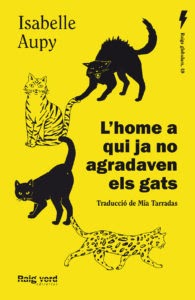
Idioma original: French
Original title: The Man Who No Longer Liked Cats
Translation: Mia Tarradas in Catalan for Raig Verd and Jean-François Silvente in Spanish for Rayo Verde
Year of publication: 2019
Valuation: Alright
There is some debate about whether reading should be done at a particular time of year or another. Some people wait for the heat of summer to dive into a book that offers them pure entertainment and that does not require too much effort to read. Others, on the other hand, prefer to delve into voluminous books, since the holidays allow (in theory) enough time to tackle books that, due to their complexity or length, require a necessary amount of time that we do not find during the rest of the year. In this case, Isabelle Aupy’s book would fall into the first group, although, being narrated in the form of an obvious metaphor, it offers more than it seems in a first reading. Let’s go!
This short book tells us about a small island populated by a few people and a lot of cats. Cats of all kinds and colours, of all possible behaviours and ways of being. The inhabitants of the island are used to them, as they live together on a daily basis and are always seen between houses and yards. But suddenly, one day, on that island, all the cats disappear and the inhabitants miss them, accustomed as they were to always seeing them wandering and walking among them. This incident leaves the inhabitants of the island surprised and disoriented, as they do not know what has happened, why, or how to deal with the situation. They have a calm, friendly character, because on the island “we were all refugees, as they say. Yes, people came here to find refuge, they left the continent because they could not take it anymore, they were looking for a place to live better, to be better, or maybe not necessarily: to find a way to be oneself and that’s it.” But, once they get over their initial shock, they realise that those who have caused the cats to be gone have other intentions, more perverse than they seemed: the desire to interfere with the customs of the island’s inhabitants and the relationships between them.
Written in the form of a metaphor, the book speaks to us about the security of our society based on the stability of everyday things and the threat posed by those who seek to change it by imposing new customs, new habits, forcing us to change reality unless we rebel against it and fight for the rights we have earned without ceasing in our efforts, because as one of the characters says when talking about the things they once owned, “they took them from us because we had let them do it to us. They took them from us because they had put words to needs that were not ours. And like a bunch of fools, we went to thank them on top of that.”
I must admit that the book has not had the impact I expected, I don’t know if it was because of the approach, the language or the very simple plot, but surely the reason for this is the style used by the author. Written in a flat language, almost aimed at a child audience in form but not in content, the first-person narrator tells us the story as if it were a fable, like a tale told to a group of young people forming a circle around a fire in the countryside, although the message hidden beneath a layer of supposed superficiality is much more worrying. A message that reinforces the importance of language and how and for what purpose we use words, and the importance of not letting ourselves be carried away by the current of a thought that under a layer of innocence can hide authentic perversions.
Source: https://unlibroaldia.blogspot.com/2024/07/isabelle-aupy-el-hombre-que-dejo-de.html


